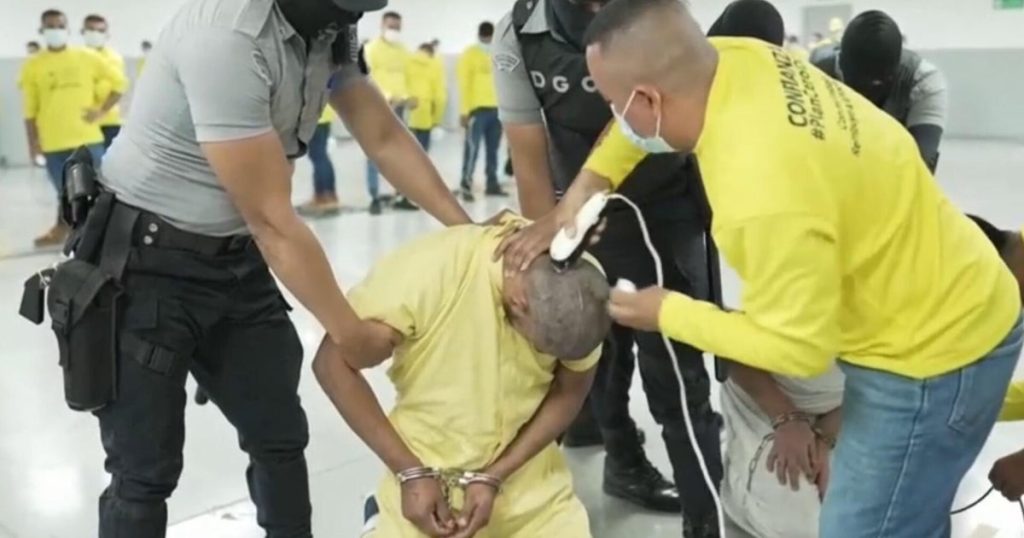In a significant legal battle, plaintiffs challenging the Trump administration’s use of wartime authority to deport alleged gang members have raised serious concerns about the implications of such actions. They argue that allowing the president to indiscriminately label groups as “enemy aliens” could undermine fundamental legal protections for migrants. Recent developments have revealed the complexities of the ongoing court case regarding the deportation flights of Venezuelan nationals connected to the Tren de Aragua gang, with a judge temporarily halting their deportation amidst appeals from the government.
| Article Subheadings |
|---|
| 1) Legal Challenges to Deportation Powers |
| 2) The Alien Enemies Act Explained |
| 3) Court Rulings and Deportation Outcomes |
| 4) Details from Immigration Officials |
| 5) Current Status of Gang Members in Custody |
Legal Challenges to Deportation Powers
The lawsuit against the Trump administration centers on the use of the Alien Enemies Act to detain and deport individuals accused of gang membership, specifically targeting alleged members of the Tren de Aragua gang. The plaintiffs, primarily five Venezuelan migrants currently in immigration custody, argue that the administration’s actions violate due process protections. Their lawyers have contended that if the president can unilaterally designate any group as enemy aliens, it could pave the way for the arbitrary detention of any individual without legal recourse. This legal challenge is crucial, as it highlights the potential ramifications of executive overreach in immigration policy.
The Alien Enemies Act Explained
Enacted in 1798 in response to the Quasi-War with France, the Alien Enemies Act allows the government to detain and deport non-citizens deemed enemies during wartime. Under this law, individuals can be subjected to deportation without the due process typically provided in immigration law, such as hearings or the opportunity to request asylum. The act’s invocation by President Trump marks a notable expansion of its application, particularly concerning individuals not engaged in active conflict but instead classified based on alleged gang affiliations. Legal experts warn that this could set a concerning precedent regarding the treatment of non-citizens and could erode civil liberties.
Court Rulings and Deportation Outcomes
In a pivotal hearing, D.C. District Chief Judge James Boasberg initially blocked the deportation flights aimed at sending the Venezuelan migrants back to El Salvador. Judge Boasberg’s decision responds to the rapid execution of deportations amid ongoing legal proceedings. The judge’s temporary ruling is significant as it reflects judicial oversight over executive power in immigration matters. Nevertheless, in a controversial move, the government proceeded with the deportation of 261 individuals, 137 of whom were connected to allegations of gang ties under the Alien Enemies Act. This action has drawn criticism and is poised to be challenged further in the courts.
Details from Immigration Officials
During the legal proceedings, testimony from ICE officials provided insight into the timing of deportation flights. According to declarations from Robert Cerna, the acting field office director for ICE’s enforcement operations, the deportation flights took off just before a judge ordered them to return to U.S. airspace, raising questions about the government’s interpretation of jurisdiction in times of international travel. Cerna’s testimony adds that the government’s claim to authority over the planes once they were in international airspace complicates applicable legal frameworks. Furthermore, the insistence by the government that Judge Boasberg lacked authority because his orders were not in writing reflects procedural disputes within the judicial process.
Current Status of Gang Members in Custody
The Union’s ongoing litigation and the use of wartime laws to justify deportation raise broader issues about the treatment of those accused gang members in custody. Officials have reported approximately 54 members of the Tren de Aragua gang currently detained in the U.S., with an additional 172 on a non-detained docket, awaiting immigration proceedings. Legal representatives of these individuals continue to advocate for the rights of their clients, emphasizing the need for judicial reviews to ensure the immigration process does not bypass established legal protections. As the case unfolds, further details regarding the total number of detainees and their legal status are likely to emerge as crucial components of the litigation.
| No. | Key Points |
|---|---|
| 1 | The Trump administration faces a lawsuit from Venezuelan migrants challenging deportations linked to gang affiliations. |
| 2 | The Alien Enemies Act permits executive action but raises civil liberties concerns regarding the treatment of non-citizens. |
| 3 | Judge James Boasberg has temporarily halted the deportations, emphasizing the need for legal oversight. |
| 4 | The deportation proceedings occurred shortly after a judicial order, causing legal controversy over jurisdiction and authority. |
| 5 | Details of additional deportations and statuses of detainees remain under judicial scrutiny as the case progresses. |
Summary
The ongoing legal case against the Trump administration’s use of the Alien Enemies Act for deportations highlights pressing issues regarding executive power, civil rights, and the treatment of immigrants in the United States. With court rulings temporarily halting mass deportations and raising urgent questions about due process rights, the implications of this case extend far beyond the individuals currently facing removal. It challenges the boundaries of legal authority in the context of immigration and national security, making it a pivotal case for the future of immigration law in the United States.
Frequently Asked Questions
Question: What is the Alien Enemies Act?
The Alien Enemies Act is a law that allows the government to detain and deport non-citizens classified as enemies during wartime without standard due process protections.
Question: Who are the key plaintiffs in the ongoing lawsuit?
The key plaintiffs are five Venezuelan men in immigration custody who have filed a civil lawsuit against the Trump administration regarding their deportation under the Alien Enemies Act.
Question: What legal recourse do those affected by deportation have?
Those affected can challenge deportations in court by raising due process violations and arguing against the government’s classification as enemy aliens, although this process can be complex and time-sensitive.


